广州市广州版四年级英语下册Unit1 四下短语与知识点归纳
四年级下册英语第一单元Unit1知识点总结
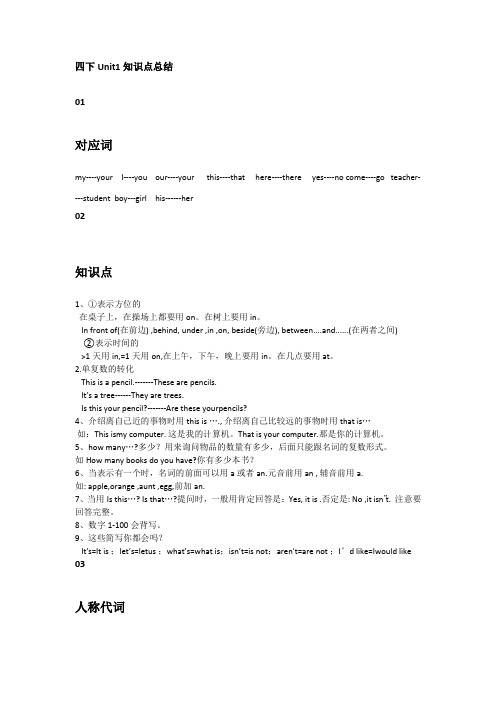
四下Unit1知识点总结01对应词my----your I----you our----your this----that here----there yes----no come----go teacher----student boy---girl his------her02知识点1、①表示方位的在桌子上,在操场上都要用on。
在树上要用in。
In front of(在前边) ,behind, under ,in ,on, beside(旁边), between....and......(在两者之间)②表示时间的>1天用in,=1天用on,在上午,下午,晚上要用in。
在几点要用 at。
2.单复数的转化This is a pencil.-------These are pencils.It’s a tree------They are trees.Is this your pencil?-------Are these yourpencils?4、介绍离自己近的事物时用this is …., 介绍离自己比较远的事物时用that is…如:This ismy computer. 这是我的计算机。
That is your computer.那是你的计算机。
5、how many…?多少?用来询问物品的数量有多少,后面只能跟名词的复数形式。
如How many books do you have?你有多少本书?6、当表示有一个时,名词的前面可以用a或者an.元音前用an , 辅音前用a.如: apple,orange ,aunt ,egg,前加an.7、当用Is this…? Is that…?提问时,一般用肯定回答是:Yes, it is .否定是: No ,it isn‟t. 注意要回答完整。
8、数字1-100会背写。
9、这些简写你都会吗?It's=It is ;let’s=letus;what’s=what is;isn’t=is not;aren't=are not ;I’d like=Iwould like 03人称代词。
四年级下英语(一年级起点)全册基础知识清单
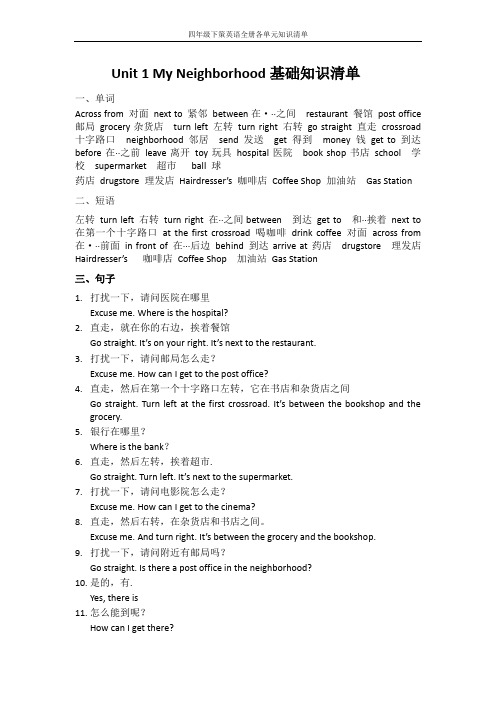
Unit 1 My Neighborhood基础知识清单一、单词Across from 对面next to 紧邻between在···之间restaurant 餐馆post office 邮局grocery杂货店turn left 左转turn right 右转go straight 直走crossroad 十字路口neighborhood邻居send发送get得到money钱get to 到达before在··之前leave离开toy玩具hospital医院book shop书店school 学校supermarket 超市ball 球药店drugstore 理发店Hairdresser’s 咖啡店Coffee Shop 加油站Gas Station 二、短语左转turn left 右转turn right 在··之间between 到达get to 和··挨着next to 在第一个十字路口at the first crossroad 喝咖啡drink coffee 对面across from 在···前面in front of 在···后边behind 到达arrive at药店drugstore 理发店Hairdresser’s 咖啡店Coffee Shop 加油站Gas Station三、句子1.打扰一下,请问医院在哪里Excuse me. Where is the hospital?2.直走,就在你的右边,挨着餐馆Go straight. It’s on your right. It’s next to the restaurant.3.打扰一下,请问邮局怎么走?Excuse me. How can I get to the post office?4.直走,然后在第一个十字路口左转,它在书店和杂货店之间Go straight. Turn left at the first crossroad. It’s between the bookshop and the grocery.5.银行在哪里?Where is the bank?6.直走,然后左转,挨着超市.Go straight. Turn left. It’s next to the supermarket.7.打扰一下,请问电影院怎么走?Excuse me. How can I get to the cinema?8.直走,然后右转,在杂货店和书店之间。
四下Unit1知识点总结
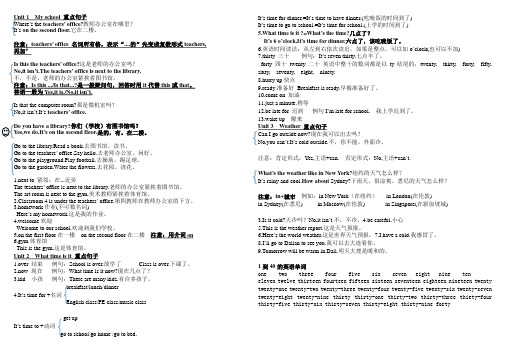
Unit 1 My school 重点句子 Where’s the teachers ’ office ?教师办公室在哪里?It ’s on the second floor.它在二楼。
注意:teachers ’ office 名词所有格,表示“....的”先变成复数形式teachers,再加’Is this the teachers ’ office?这是老师的办公室吗? No,it isn ’t.The teachers ’ office is next to the library.不,不是。
老师的办公室紧挨着图书馆。
注意:Is this .../Is that...?是一般疑问句,回答时用it 代替this 或that 。
答语一般为Yes,it is./No,it isn ’t.Is that the computer room?那是微机室吗?No,it isn ’t.It ’s teachers ’ office.Do you have a library?你们(学校)有图书馆吗?Yes,we do.It ’s on the second floor.是的,有。
在二楼。
Go to the library.Read a book.去图书馆。
读书。
Go to the teachers ’ office.Say hello.去老师办公室。
问好。
Go to the playground.Play football.去操场。
踢足球。
Go to the garden.Water the flowers.去花园。
浇花。
1.next to 紧邻;在...近旁The teachers ’ office is next to the library.老师的办公室紧挨着图书馆。
The art room is next to the gym.美术教师紧挨着体育馆。
2.Classroom 4 is under the teachers ’ office.第四教师在教师办公室的下方。
四年级下册英语各单元知识点

四年级下册英语各单元知识点以下是四年级下册英语各单元知识点:
Unit 1:我的学校
1. 掌握学校设施的词汇:教室、图书馆、操场、食堂等。
2. 学习表达时间和地点的常用句型。
3. 了解学校日常活动和课程安排。
Unit 2:我的家庭
1. 掌握家庭成员的词汇:爸爸、妈妈、兄弟、姐妹等。
2. 学习介绍家庭成员和职业的句型。
3. 了解家庭生活习惯和文化。
Unit 3:在农场
1. 掌握农场动物的词汇:牛、猪、鸡、鸭等。
2. 学习描述农场动物和农作物的句型。
3. 了解农场生活和农业知识。
Unit 4:天气
1. 掌握描述天气的词汇:晴天、雨天、雪天、多云等。
2. 学习表达温度和天气的常用句型。
3. 了解不同地区和季节的天气特点。
Unit 5:节日
1. 掌握常见节日的词汇:春节、中秋节、端午节、圣诞节等。
2. 学习描述节日活动和习俗的句型。
3. 了解不同国家和地区的节日文化。
Unit 6:购物
1. 掌握常见商品的词汇:衣服、鞋子、玩具、文具等。
2. 学习购物时常用的句型。
3. 了解购物习惯和消费文化。
Unit 7:数字与时间
1. 掌握数字0-100的英文表达方式。
2. 学习时间的基本表达方式,包括小时、分钟等。
3. 了解时间在生活中的运用,如日常作息时间等。
(部编)统编版四年级英语下册第一单元知识小结

(部编)统编版四年级英语下册第一单元知
识小结
本单元的研究内容主要包括以下几个方面:
一、重点短语
研究园地、北极熊、国庆节、中秋节、地球、世界、旅游车、动物园、照相机、冰淇淋、回家
二、语法要点
1. 现在进行时:
am/is/are + doing
如:I am playing football.
2. 物主代词:
my、your、his、her、its、our、their
如:This is my book.
3. 一般疑问句:
用动词的原形在句首 + 主语
如:Are you running?
4. 选择疑问句:
用疑问代词在句首 + be/am/is/are + 主语 + 动词原形如:What are you doing?
三、听力技巧
1. 注意听力语境,理解对话全貌。
2. 重点听取关键词。
3. 注意听取时间、地点、人物等信息。
4. 如果听不懂,可以请老师或同学帮忙。
四、研究策略
1. 多听、多读、多说、多写。
2. 培养良好的研究惯,经常复课堂内容。
3. 积极参与课堂讨论和活动,提高口语表达能力。
4. 利用多媒体工具和网络资源加强研究效果。
通过学习,我们不仅能掌握相关的语言表达技巧,还能了解到
丰富的知识和文化内涵。
希望同学们能够在学习中获得快乐和进步!。
广州英语四下U1知识点整理

广州英语四下U1知识点整理U1Helookslikeacookwhichglassesher(宾格)him(宾格)知道----knowpolicewoman--policewomenuniform【短语】looklike看起来像withglasses戴眼镜besideher在她旁边inawhitehat戴着一顶白色圆边帽inablackuniform穿着黑色制服inawhitecoat穿着一件白色大衣inbluejeans穿着蓝色牛仔裤inabluejacket穿着一件蓝色夹克衫inapinkdress穿着粉红色连衣裙【句子】1.--Who’sthatwoman?那个女人是谁?--She’sMissLiu,ourteacher.她是我们的老师,刘老师。
2.--Whichwoman?哪个女人?--Theonewithglasses.那个戴眼镜的。
3.--Canyouseehim?你能看到他吗?--Yes,Ican./No,Ican’t.是的,我能。
/不,我不能。
4.--Dotheylookhappy?他们看起来很开心吗?--Yes,theydo./No,theydon’t.是的,他们是./不是,他们不是。
主格宾格形容词性物主代词 I me my you you your he him his she her her it it its they them their 规律:动词前面用主格;动后介后用宾格;形容词性物主代词,后面要有个名词。
【Let’spractise】1._____amapupil.2.ThisisT om.Lookat____.3.ThisisT om’sdog.Lookat____.4._____booksareoverthere.(他们的)5.Sheisacook.______nameisLucy.6.Lookatthechildren.Lookat_ _____.7.Maryisagirlwithglasses.Canyousee_____?8.HeisJack.______fatherisafarmer.9.Lookattheman.____isourteacher.知识点整理。
四年级英语下册Unit1单元知识点归纳新版PEP

四年级英语下册Unit1单元知识点归纳(新版PEP)四年级英语下册Unit1单元知识点归纳(新版PEP)I. 词汇:(1)classroom教室 window窗户 blackboard 黑板light 电灯ure 图画 door 门teacher’s desk 讲台computer 计算机 fan电扇 wall墙 floor 地板(2) really 真的 near 距离近 TV 电视 clean 打扫 help 帮助II. 词组、短语;door 开门 tulight 开灯clwindow 关窗子put uure 张贴图画 clean the blackboard 擦黑板 clean the window 擦窗子 clean the classroom 打扫教室III. 句型;1、We have a new cla我们有一间新的教室。
It’s so big. 它很大1、What’lassroom ? 教室里面有什么?blackboard、one TV、many desks and cha有一块黑板、一台电视、许多的课桌和椅子。
2 Let’s clean the cla让我们一起打扫教室吧。
① OK. 好。
② Good idea . 好主意。
③ Allright .好的。
3、Let me cleaacher’s desk.。
让我来擦讲桌。
4、 Let me clean the windows. 让我来擦窗子。
5、 Llp you. 让我来帮助你。
Thank you. 谢谢6、Where’s my seat ?我的座位在哪里?Let’s go and see.让我们一起去看一看吧 7、7、W?它在哪里?8、It’s near the window.它在窗子的附近。
It’desk. 它在桌箱里面。
It’acher’s desk. 它在讲桌上。
It’s undair. 它在椅子的下面。
9、Tw cla这是新的教室。
四年级英语下册Unit1单元知识点归纳(新版PEP)
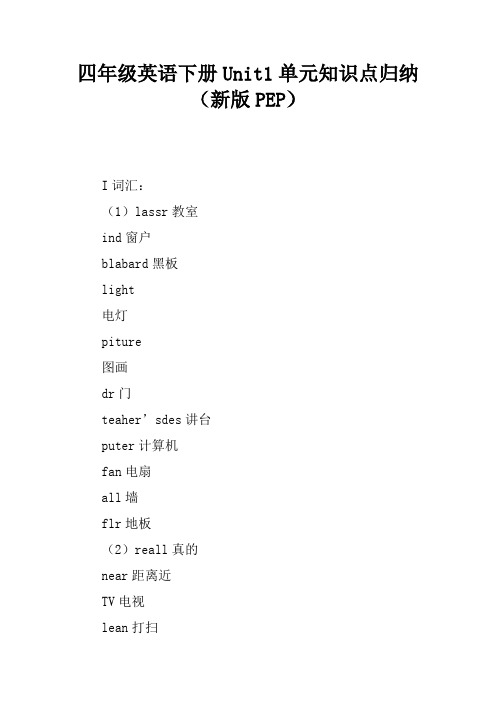
四年级英语下册Unit1单元知识点归纳(新版PEP)I词汇:(1)lassr教室ind窗户blabard黑板light电灯piture图画dr门teaher’sdes讲台puter计算机fan电扇all墙flr地板(2)reall真的near距离近TV电视lean打扫help帮助II词组、短语;penthedr开门turnnthelight开灯lsetheind关窗子putupthepiture张贴图画leantheblabard擦黑板leantheind擦窗子leanthelassr打扫教室III句型;、ehaveanelassr,我们有一间新的教室。
It’ssbig它很大、hat’sinthelassr?教室里面有什么?neblabard、neTV、andessandhairs有一块黑板、一台电视、许多的桌和椅子。
2Let’sleanthelassr让我们一起打扫教室吧。
①好。
②Gdidea好主意。
③Allright好的。
3、Leteleantheteaher’sdes。
让我来擦讲桌。
4、Leteleantheinds让我来擦窗子。
、Letehelpu让我来帮助你。
Thanu谢谢6、here’sseat?我的座位在哪里?Let’sgandsee让我们一起去看一看吧7、7、hereisit?它在哪里?8、It’sneartheind它在窗子的附近。
It’sinthedes它在桌箱里面。
It’sntheteaher’sdes它在讲桌上。
It’sunderthehair它在椅子的下面。
9、Thisisthenelassr这是新的教室。
Thedrisrange门是橙色的。
Thedessaregreen桌是绿色的。
0、Ilielassr我喜欢我的教室。
巩固练习:一、找出下列每组单词中不合群的单词,填序号。
()1AneBtfirst()2AnBnexttis()3AgardenBftball plagrund()4AartrBshlteahers’ffie ()AusirBgarden puterr二、单项选择题。
四年级下册英语笔记

四年级下册英语笔记一、重点单词1. family 家庭2. friend 朋友3. school 学校4. library 图书馆5. post office 邮局6. hospital 医院7. police station 警察局8. science museum 科学博物馆9. cinema 电影院10. train station 火车站二、重点短语1. meet at the school gate 在校门口集合2. take the train 乘火车3. get to the train station 到达火车站4. on the way to the library 在去图书馆的路上5. post a letter 寄信6. buy some books 买书7. go to the cinema 看电影8. see a film 看电影9. go to the hospital 去医院10. be ill 生病三、重点句型1. Where do you live? 你住在哪里?I live in + 地点。
我住在+地点。
2. How do you get to + 地点?你怎么到达+地点?I get to + 地点 + by + 交通方式。
我通过+交通方式+到达+地点。
3. What do you do at the weekend?你周末做什么?I often + 动词。
我经常+动词。
偶尔会+动词。
有时+动词。
4. What are you going to do this weekend?你这个周末打算做什么?I’m going to + 动词。
我打算+动词。
广州版小学英语四年级下短语、句型汇总

广州版小学四年级(下)短语和句型汇总短 语句 型Module 1 People Unit 1 He looks like a cook in a black uniform 穿着黑色制服穿着黑色制服in an orange jacket 穿着橙色夹克穿着橙色夹克 in a white coat 穿着白色大衣穿着白色大衣 in blue jeans 穿着蓝色牛仔裤穿着蓝色牛仔裤 in a pink dress 穿着粉红色连衣裙穿着粉红色连衣裙 with glasses 戴着眼镜戴着眼镜1.---Who 1.---Who’’s that woman? 那个女人是谁那个女人是谁那个女人是谁 ---She ---She’’s Miss Liu, our teacher. 她是我们的老师,刘老师。
2.---Which woman? 哪个女人?哪个女人? --The one with glasses.那个戴眼镜的。
那个戴眼镜的。
3.---Can you see him? 你能看见他吗?你能看见他吗? ---Yes, I am. 是的,我能是的,我能 Module 1 People Unit 2 She is very kindmaths teacher 数学老师数学老师 round face 圆脸圆脸 Chinese teacher 语文老师语文老师 big eyes 大眼睛大眼睛 art teacher 美术老师美术老师 big nose 大鼻子大鼻子 big mouth 大嘴巴大嘴巴 long hair 长头发长头发 brown hair 棕色头发棕色头发 short hair 短头发短头发 1.---What is she like? 她长什么样子?她长什么样子?---She has green eyes and a small mouth. 她有一双绿色的眼睛和一张小小的嘴巴。
她有一双绿色的眼睛和一张小小的嘴巴。
人教英语四年级下册第1单元重点知识总结
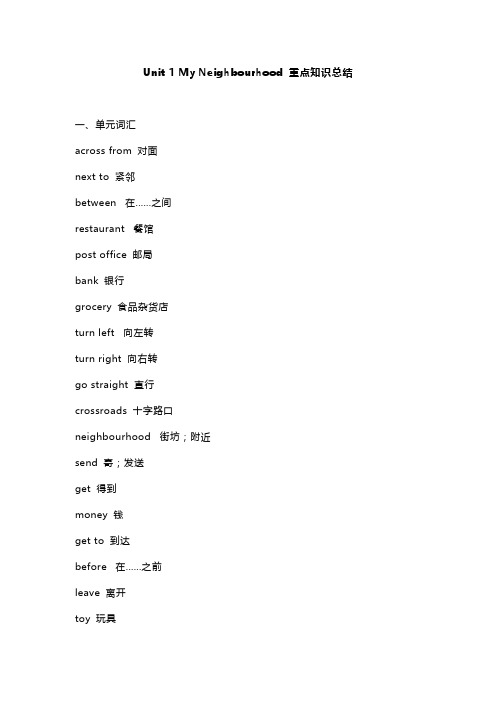
Unit 1 My Neighbourhood 重点知识总结一、单元词汇across from 对面next to 紧邻between 在......之间restaurant 餐馆post office 邮局bank 银行grocery 食品杂货店turn left 向左转turn right 向右转go straight 直行crossroads 十字路口neighbourhood 街坊;附近send 寄;发送get 得到money 钱get to 到达before 在......之前leave 离开toy 玩具hospital 医院bookshop 书店school 学校supermarket 超市ball 球二、单元句型1. A: Excuse me. Where is the hospital?对不起。
医院在哪里?B: Go straight. It s on your right. It s next to the restaurant.直走。
它在你的右边。
它紧邻餐馆。
2. A: Excuse me. How can I get to the post office?对不起。
我如何到达邮局?B: Go straight and turn left at the first crossroads.It s between the bookshop and the grocery.直走,在第一个十字路口左转。
它在书店和食品杂货店之间。
3. A: Where is the bank?银行在哪儿?B: It s between the supermarket and Sunday Park.它在超市和星期天公园之间。
4. A: Excuse me. Is there a post office in the neighbourhood?对不起。
在附近有邮局吗?B: Yes, there is. 是的,有。
四年级下册英语知识点unit1

掌握常见阅读理 解题型及解题方 法
提高阅读速度和 理解能力
学会定位关键信 息和筛选无关信 息
培养良好的阅读 习惯和思维方式
通过阅读本单元的课文和其他相关资料,提高阅读理解能 力
通过阅读本单元的课文,掌握重点词汇和句型,理解文章大意。
结合图片和上下文,推测生词的含义,提高阅读速度和准确性。
完成课后阅读理解练习,巩固所学知识,提高解题技巧。
YOUR LOGO
添加标题
拓展词汇:本单元涉及的词汇包括动物、数字、颜色等,通过写作练习,学生可以 拓展自己的词汇量,丰富自己的表达方式。
添加标题
培养写作习惯:写作练习是提高英文写作能力的重要途径之一,通过本单元的练习, 学生可以养成良好的写作习惯,提高自己的写作水平。
THANK YOU
汇报人:XX
汇报时间:20XX/XX/XX
不完全爆破:在英语发音中,有些单词或音节在发音时会出现不完全爆破 的现象,这种现象称为不完全爆破
语音知识的重要性:掌握连读和不完全爆破等语音技巧对于提高英语口语 流利度和准确性非常重要
练习方法:通过模仿英语母语者的发音、多听多说、使用语音学习软件等 方式来练习掌握语音技巧
阅读理解
学习并掌握阅读理解的基本技巧和方法
学习并掌握本 单元的元音发 音规则,如[æ], [ai],[au]等。
学习并掌握本 单元的辅音发 音规则,如/p/, /b/,/t/等。
了解并掌握本 单元的音节和 重音的规则。
通过模仿和练 习,提高自己 的语音准确性
和流利度。
学习并掌握本单元的连读和不完全爆破等语音技巧
连读:在英语口语中,两个或多个单词连在一起读时,语音会发生一些变 化,这种现象称为连读
四年级下册英语一二单元知识点

四年级下册一二单元知识点Unit 1 Lesson 1一、单词1. you 你,你们2. teacher 老师3. hello/hi 喂,你好4. your 你的,你们的5. name 名字6. friend 朋友7. pupil 小学生8. his 他的9. her 她的10. welcome 欢迎11. back 回来12. call 称呼,叫二、短语1. a new teacher 一位新老师2. a new friend 一位新朋友3. a new pupil 一位新学生4. very well 非常好三、句子1. Welcome back to school. 欢迎回到学校.2. You can call me Mr. Wood. 你们可以叫我伍德老师。
3. -Nice to meet you . 认识你很高兴。
-Nice to meet you, too. 认识你也很高兴。
4. He is a new pupil. 他是一位新学生。
5. These are my friends.这是我的朋友们。
6. His name is Danny. 他叫丹尼。
7. Her name is Kim. 她叫金。
8. -How are you? -Fine, thanks./ Very well, thank you.你好吗?我很好,谢谢。
Lesson 2一、单词1. pencil 铅笔2. pencil box 铅笔盒3. what 什么4. pen 钢笔5. ruler 直尺6. crayon 彩色蜡笔7. whose 谁的二、短语1. whose pencil 谁的铅笔2. Danny's pencil 丹尼的铅笔(某人的是在某人的后面加’s)三、句子1. Is this your pencil ?这是你的铅笔吗?肯定回答Yes, it is. 否定回答No, it isn't.2. Is it Steven's pencil ?它是史蒂芬的铅笔吗?肯定回答Yes, it is. 否定回答No, it isn't.3. It's not his pencil. 它不是他的铅笔。
最新广州版四年级英语下册Unit1

最新广州版四年级英语下册U1 He looks like a cook重点短语in a black uniform 穿着黑色制服in a orange jacket 穿着橙色夹克in a white coat 穿着白色大衣in a blue jeans 穿着蓝色牛仔裤in a pink dress 穿着粉色连衣裙with glasses 戴着眼镜语法讲解:Look like 看起来像。
通常指外表看来像Like 为介词,当主语为第三人称单数时,look要加sThe one with glasses.With 有… ,带有… 介词,不能做谓语表示修饰Beside 介词在…旁边同义的短语还有next to , near , close to And that man in a white hat?In a white hat 表示“带着白色帽子的”in + 颜色,表示“穿着。
颜色的衣服”In red T-shirt in a blue jacket in a black uniformPractice 练习:一、选出你所听到的单词。
1. ( ) A. policeman B. policewoman 2. ( ) A. cook B. look 3. ( ) A. with B. she’s4. () A.builder B. doctor 5. ( ) A. him B. her二、选择不同类的单词。
1. ( ) A. baby B. father C. mother2. ( ) A. skirt B. glasses C. shirt3. ( ) A. her B. he C. she4. ( ) A. forty B. nice C. nine5. ( ) A. picture B. photo C. know三、英汉互译。
1. 戴眼镜________________.2. In a pink sweater anf green shorts ________________________.3. 他旁边有个包._____________________.4. 看起来像农民。
四下英语Unit1知识点总结

四下unit1考点知识总结姓名:___________一、重点短语和句型:今天早上this morning 今天下午this afternoon你呢?What about you? 它很有趣It’s fun很高兴见到你Nice to see you也很高兴见到你Nice to see you too我们的新课程表our new timetable欢迎回到学校welcome back to school你喜欢什么学科?What subjects do you like?我们有什么课程?What lessons do we have?让我们去操场吧Le t’s go to the playground二、重要用法总结:1、our 译为:(我们的)we 译为:(我们)2、Miss 译为:(小姐)Mr 译为:(先生)Mrs 译为:(夫人)3、肯定句:“我喜欢…”I like … 否定句:“我不喜欢…”I don’t like…4、“也”too 用在(肯定和疑问)句,放在句(末)either用在(否定)句,放在句(末)5、this 表示(单)数,意思是这个;它的复数形式为:(these),意思是这些that表示(单)数,意思是那个,它的复数形式为:(those),意思是那些6、”该是做某事的时间了” It’s time for+(名词)It’s time to +(动词)7、“某人有…” 用have 或has 填空:I ________ He_________ Liu Tao________ We__________ It_________ Bobby and Sam______________ She__________ you _______ my mother ___________( 总结:He、She、It、一个人名,用has )。
四年级下册英语第一单元知识归纳
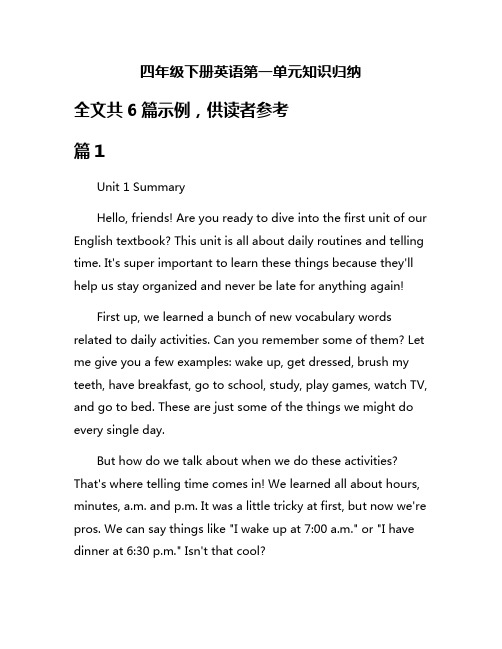
四年级下册英语第一单元知识归纳全文共6篇示例,供读者参考篇1Unit 1 SummaryHello, friends! Are you ready to dive into the first unit of our English textbook? This unit is all about daily routines and telling time. It's super important to learn these things because they'll help us stay organized and never be late for anything again!First up, we learned a bunch of new vocabulary words related to daily activities. Can you remember some of them? Let me give you a few examples: wake up, get dressed, brush my teeth, have breakfast, go to school, study, play games, watch TV, and go to bed. These are just some of the things we might do every single day.But how do we talk about when we do these activities? That's where telling time comes in! We learned all about hours, minutes, a.m. and p.m. It was a little tricky at first, but now we're pros. We can say things like "I wake up at 7:00 a.m." or "I have dinner at 6:30 p.m." Isn't that cool?One of the most useful things we practiced was asking and answering questions about daily routines. We can ask each other "What time do you get up?" or "When do you do your homework?" Knowing each other's schedules helps us make plans to hang out or study together.Do you remember the story we read about Sam's daily routine? He was a really busy kid! He woke up early, had a healthy breakfast, went to school, played soccer after school, did his homework, helped with chores, and finally got to relax before bedtime. Phew, I'm tired just thinking about it!We also learned about the days of the week and months of the year. Saying things like "I have soccer practice on Tuesdays and Thursdays" or "My birthday is in August" is super handy. Keeping track of the calendar is important for not missing any special days or events.Another cool thing we did was make schedules and timetables. We could write out our whole daily routine hour by hour, from morning to night. Or we made timetables showing our weekly activities, like when we have English class, art club, or piano lessons. Having a schedule helps us stay organized and use our time wisely.Remembering to use words like "first, next, then, and finally" was really important for talking about routines and putting things in order. Like, "First I wake up, then I get dressed, next I have breakfast, and finally I go to school." See how clearly that explains the sequence?Whoa, that was a lot to cover in one unit! We learned so many helpful vocabulary words and phrases for describing our daily lives. Things like daily routines, telling time, days and months, schedules, and sequencing are all skills we'll use over and over again.I hope this review has refreshed your memory on everything we learned. Give yourself a big pat on the back for working so hard! Mastering this unit will make the rest of the year feel like a breeze. Keep up the great work, my friends!篇2Unit 1 - All About MeThis unit was all about learning how to introduce ourselves and share information about our lives. It was really fun because we got to talk about our hobbies, families, favorites, and more!The first thing we learned were the question words - who, what, where, when, why, and how. These little words help us ask lots of different kinds of questions. Who is for asking about people, what is for asking about things, where is for asking about places, when is for asking about times, why is for asking about reasons, and how is for asking about the way something is done.Next we practiced asking and answering questions using the verb "to be." Things like "What is your name?" "My name is Amy." Or "Where are you from?" "I am from Beijing." Using "to be" properly is really important for introducing ourselves.We also learned about subject pronouns like I, you, he, she, it, we, and they. Subject pronouns are used as the subject of a sentence instead of using a name. For example, instead of saying "Amy is 10 years old," I would say "I am 10 years old."Another thing we studied were possessive adjectives like my, your, his, her, its, our, and their. These are useful for talking about the things that belong to us or others. Like "This is my schoolbag" or "Their dog is very friendly."The verb "to have" is super useful too. We can use it to talk about our belongings, family members, hobbies, and more. For example, "I have a little sister" or "David has a collection of toy cars."Speaking of hobbies, we learned a ton of vocabulary words for different activities people like to do for fun. Some examples are reading, cooking, hiking, swimming, painting, and playing sports or musical instruments. It was really interesting to learn about all the different hobbies my classmates enjoy.We also covered vocabulary for describing personalities. Words like kind, smart, funny, brave, hardworking, and more. It's nice to be able to compliment our friends and family on their great personality traits.Family vocabulary was important too. We learned words like mother, father, brother, sister, grandparents, cousins, aunts, and uncles. Using possessive adjectives with these words helps specify who we're talking about - like "my brother" or "her cousins."One of my favorite activities was sharing about our routines and schedules using frequency adverbs like always, usually, sometimes, rarely, and never. We made sentences like "I always brush my teeth before bed" or "My brother never remembers his homework."Towards the end of the unit, we put everything together and gave full self-introductions. We stated our name, age, where we're from, described our families and hobbies, and shared otherinteresting details about ourselves. It was fun to learn so much about my classmates!Overall, Unit 1 gave us a really strong foundation for basic conversation. Now we know how to greet people, introduce ourselves, ask about others, share details about our lives, and more. I feel much more confident speaking English after all we learned. Can't wait for the next unit!篇3Unit 1: My Wonderful FamilyHi there! I'm so excited to share with you what I learned in the first unit of our new English textbook. It's all about families, which is such an important topic because our families are the people who love us the most in the world!First up, we learned lots of new vocabulary words related to family members. Can you believe there are so many different words to describe the different people in our families? Here are some of the ones I remember:Mom, dad, parents, grandma, grandpa, grandmother, grandfather, aunt, uncle, cousin, sister, brother, sibling, nephew, niece, in-laws, stepmother, stepfather, stepsister, stepbrother.Whew, that's a lot of words! It's kind of confusing to keep them all straight, but my teacher says that's okay because we'll keep practicing, and soon they'll all become second nature.Next, we learned how to introduce our family members to others. It's really important to be able to do this because families are such a big part of our lives. We practiced phrases like:"This is my mom, her name is...""These are my grandparents, they are...""That's my little brother, his name means..."We also talked about different types of families and how every family is unique and special. Some kids live with just one parent, some live with grandparents or other relatives, and some have two moms or two dads. But no matter what a family looks like, the most important thing is that there is love.My favorite part was when we learned about family traditions and customs from around the world. Did you know that in some countries, extended families with grandparents, aunts, uncles, and cousins all live together in one big house? In other places, it's traditional for the youngest child to care for their elderly parents. We even learned about some unique coming-of-age ceremonies that mark the transition from child toadult in different cultures. Learning about all these fascinating traditions really opened my eyes to how diverse the world is!We read some wonderful stories about families overcoming obstacles, helping each other out, and making wonderful memories. My personal favorite was the one about the family who went camping for the first time and got caught in a huge thunderstorm – but instead of being scared, they all started dancing and singing in the rain! What a funny and joyful way to make the best of a difficult situation.To wrap up the unit, we talked about different ways to show our love and appreciation for our families. We brainstormed ideas like writing thank-you notes, cooking a special meal, giving hugs, spending quality time together, and simply telling our family members how much they mean to us. Because at the end of the day, that's what families are all about – surrounding ourselves with people who care about us unconditionally.I have to say, this unit was so much fun and really made me appreciate my own wonderful family even more. I can't wait to put what I learned into practice and strengthen those loving bonds. Families truly are the greatest gift!篇4Unit 1 Topic: My DayHi friends! In our first unit this semester, we learned all about talking about our daily routines and schedule. It was super useful because now I can tell you all about my typical day!In the morning, I wake up bright and early around 7am. The first thing I do is make my bed - my mom is really strict about that! Then I go to the bathroom to brush my teeth and wash my face. I have to be careful not to make too much noise or I'll wake up my little brother.After that, I get dressed for school, putting on my uniform which is just a plain white shirt and navy blue pants. Simple but I like it! While I'm getting ready, my mom is downstairs cooking us a yummy breakfast. My favorite is her pancakes but usually it's just toast or cereal.At 7:45am, my dad drives me and my brother to school. The drive takes about 15 minutes. In the car, we practice some English phrases together like "How was your day?" and "I had a great day!" My parents really want us to learn English well.School starts at 8:30am sharp. My first few classes are the big subjects like math, Chinese, and science. Those can be kind of boring but I work really hard because I want to get good grades.Around 10:30am we get a short snack break where I can have a piece of fruit or yogurt from home.After snack time, we have classes like art, music, and PE which are way more fun! My favorite is music because I love singing songs and learning about notes and rhythms. For PE we usually play games like basketball or kickball. I'm not very athletic but I still have a lot of fun.At noon, it's lunchtime! My mom packs me a lunch box with dishes like fried rice, dumplings, or noodles. After eating, we get to go outside and run around the playground for recess until1pm. That's the best part of the day in my opinion!In the afternoon from 1-3pm, we have more academic classes but they aren't as hard as the morning ones. Around 3:15pm, my dad picks us up and we go home. I'm always starving so I have a snack like cookies or fruit while my mom prepares dinner.For a few hours I work on my homework assignments, making sure I understand everything. If I have any questions, my parents are good at helping me. We speak Chinese at home but I practice my English skills when I can.By 6:30pm, I've finished all my homework and I get some free time to relax! I love reading comic books, playing video games, or watching cartoons. We have dinner around 7pm, usually a homecooked Chinese meal.After dinner, I take a bath and then get ready for bed around 9pm. Before going to sleep, my parents make me practice some English one last time, like naming objects around the house or rating the day's weather. Finally, I'm off to dream land!That's pretty much my normal schedule from Monday-Friday. On the weekends, I get to sleep in later which is awesome. We'll often go somewhere fun like the park, museum, or even a mall. Sometimes friends come over to my place and we play together.I also have extracurricular activities twice a week after school. On Tuesdays, I take a Chinese brush painting class where I'm learning traditional ink artwork. Thursdays I have a math competition club to prepare for academic contests. It's a lot of work but I enjoy it!As you can see, my days are packed with school, activities, homework, and time with family. But I still get to have fun and pursue my interests too. Throughout it all, I'm constantly practicing my English skills because it's a key focus for my parents and teachers.Learning a new language can be challenging for sure. But using it regularly through real conversation makes it much easier.I may only be in 4th grade but I feel like my English is improvinga lot this semester! Being able to describe my daily routine was just one of the useful skills we covered in Unit 1.Well, that's all for my day in the life! Let me know if you have any other questions. I'll do my best to explain things clearly in my basic kid English. Thanks for reading and I'll see you next unit!篇5Unit 1 Summary - My DayHi there! In this unit, we learned all about talking about our daily routines and activities. It was really fun and useful. Let me tell you about what I picked up.First up, we practiced using simple present tense verbs to describe the things we regularly do each day. These are verbs like "go", "eat", "study", "play", etc. We use these to say things like "I go to school at 8 AM" or "My mom cooks dinner every night." Pretty straightforward!But then we learned about some funky rules for using these verbs properly with different subjects. Like if I say "He go to thepark", that's wrong! For most verbs with "he/she/it", we need to add "-s" or "-es" to the end. So it's "He goes to the park." Wild, right? With "I/you/we/they" though, we just use the basic verb with no extra letters.It took some practice, but eventually using verbs like "watches", "brushes", "fixes" started to feel natural when talking about other people and things. Phew! Verb forms are tricky business in English.The next topic was using frequency adverbs like "always", "usually", "sometimes", "never", etc. To use these, we put them before the main verb. For example:"I always brush my teeth before bed.""My brother never makes his bed.""We sometimes go to the movies on weekends."These little adverbs help make our sentences more descriptive and specific about how often things happen. Super handy!Then we looked at using object pronouns like "me", "you", "him", "her", "it", "us", "them" when the noun is the object receiving the action. For instance:"My dad helps me with my homework.""The cat is chasing it!""Can you pass them the ball please?"Using the right object pronoun instead of repeating the noun makes our English flow way better. No more saying "Can you pass the ball to John and Jane?" We can just use "them"!Okay, next we covered the very useful verb "to have" and how it lets us talk about possessing things:"I have a pet dog.""She has a big teddy bear.""They don't have any video games."We can use "have" for all kinds of things - pets, toys, games, family members, you name it! Handy verb to know.And the last new grammar point was about asking questions in the simple present tense using "do/does":"Do you like pizza?" Yes, I do!"Does your mom work in an office?" No, she doesn't."What do you usually have for breakfast?"By putting "do" or "does" before the subject and main verb, we can turn any statement into a question. Asking questions like this makes conversations way more interactive.Phew, that's a lot of grammar! But learning it all lets me describe my daily routine and activities like a pro now. For example:"I usually wake up at 7 AM. My dad always makes me breakfast, and then I brush my teeth and get dressed. My mom sometimes drives me to school, but I often walk with my friends too. I have English class first period..."See? I can talk about my whole day using all the simple present tricks we picked up! Wow, English is awesome.We also learned a ton of new vocabulary words related to daily life, household items, school supplies, and activities. Words like:Alarm clock, calendar, slippers, backpack, pencil case, eraser, recess, chores, skateboard, yoga mat...the list goes on!Having all these new words in my English vocabulary lets me communicate about so many more topics now. No more being at a loss for words to describe the little things in my daily life.To wrap up, here are the key grammar concepts and vocabulary themes from Unit 1:Grammar:Simple present verbsVerb form rules for he/she/itFrequency adverbsObject pronounsPossessive "have"Question structure with do/doesVocabulary:Daily routines and activitiesHousehold items and roomsSchool suppliesHobbies and interestsLearning all this has seriously leveled up my English skills for talking about the ins and outs of my everyday life. I'm feeling a lot more confident holding conversations now!Does that cover the main points from this unit? Let me know if you need any clarification or have additional questions. I'll do my best to explain further. Thanks for reading!篇6Unit 1: My DayHey there! I'm so excited to tell you all about the first unit we learned in English class this semester. It was called "My Day" and it taught us how to talk about our daily routines and activities. Get ready for an action-packed adventure through my typical day!Let's start from the very beginning – waking up! I learned how to say "I wake up at 7 o'clock" and "I get up early." Sometimes I oversleep and have to say "I'm late for school!" But most mornings, I hop out of bed feeling refreshed and ready to conquer the day.After waking up, it's time to get ready. I learned how to say "I brush my teeth" and "I comb my hair." I also say "I get dressed" when I put on my clothes for the day. And of course, I can't forget "I have breakfast" because a good breakfast gives me energy for the rest of the day!Once I'm all ready, it's off to school! I walk to school, so I can say "I walk to school." Sometimes my mom or dad drives me, and then I say "I go to school by car." If it's raining, I might say "I go to school by bus" or "I take the bus to school."At school, I have lots of classes and activities to talk about. I can say "I study English" or "I have an English class." I also say things like "I have math class" and "I do my homework." School is fun, but it's also a lot of work!After a long day of learning, it's time for some fun! I love playing sports, so I learned how to say "I play basketball" and "I go swimming." If I'm not in the mood for sports, I might say "I watch TV" or "I listen to music." My favorite activity is probably "I read books" because books can take you on incredible adventures.As the day winds down, I start getting ready for bed again. I say "I take a shower" and "I brush my teeth" once more before hopping into my pajamas. Before going to sleep, I always say "I do my homework" to make sure I've finished all my assignments for the next day.Finally, I'm ready for bed! I snuggle up under the covers and say "I go to sleep at 9 o'clock." Sometimes I have trouble fallingasleep, so I'll say "I can't sleep" or "I'm not sleepy." But most nights, I'm out like a light as soon as my head hits the pillow.And that's a full day in my life! From waking up to going to sleep, I learned so many great phrases to describe my daily routines and activities. This unit was super helpful for improving my English conversational skills.I can't wait to learn more in our next unit. English class is always filled with fun, engaging activities that make learning the language feel like an exciting adventure. Bring on the next challenge!。
四年级下册英语第一单元知识点总结

四年级下册英语第一单元知识点总结English:In the first unit of fourth grade English, students will learn important vocabulary and grammar concepts to help them communicate effectively in English. This unit focuses on introducing classroom objects, school subjects, and basic phrases used in conversation. Students will also learn the present tense of the verb "to be" and basic prepositions that describe location. In addition, they will practice expressing their likes and dislikes, as well as giving basic personal information such as name, age, and nationality. Throughout the unit, students will practice their listening, speaking, reading, and writing skills through a variety of activities and exercises.中文翻译:在四年级英语的第一个单元,学生将学习重要的词汇和语法概念,以帮助他们有效地用英语交流。
本单元着重介绍了课堂用品、学科和基本对话中使用的短语。
学生还将学习“to be”动词的现在时态以及描述位置的基本介词。
此外,他们还将练习表达自己的喜好和不喜欢,以及提供基本的个人信息,例如姓名、年龄和国籍。
- 1、下载文档前请自行甄别文档内容的完整性,平台不提供额外的编辑、内容补充、找答案等附加服务。
- 2、"仅部分预览"的文档,不可在线预览部分如存在完整性等问题,可反馈申请退款(可完整预览的文档不适用该条件!)。
- 3、如文档侵犯您的权益,请联系客服反馈,我们会尽快为您处理(人工客服工作时间:9:00-18:30)。
2. him , her,me, them等宾语用于动词(V.)后面,简称“动宾”。
I don’t know him.
3.主语(第三人称单数)+动词s/动词es,简称“三单+Vs”.
【第三人称单数判断口诀:不是我、你(I,you),不是复数,就是三单】
Helooks strong.
广州市广州版四年级英语下册
5.…in blue jeans穿着蓝色牛仔裤的…
6.…witha baby带/抱着一个婴儿的…
7.…with a cap/hat戴着一顶帽子的…
8. beside her/him在她/他旁边
9. wear a yellow T-shirt穿着一件黄色的T恤衫
10.looks likeacook看起来像位厨师
Unit 1短语、重点句与知识点归纳(贴于课本P3)
一、短语
1. theonewith glasses戴着眼镜的那个人
2. thepolicewomanin a black uniform穿着黑色制服的女警察
3.…inanorangejacket穿着一件橙色夹克的…
4….in a white coat穿着白色大hat woman? She’sSally.
Who’sthat man? He’sTom.
2.问哪一个?Whichwoman?The onewith glasses.
Whichman?The onein a white hat.
3...看起来... He/She looks...(形容词)He looks strong.
4...看起来像... He/She looks like ... (名词)He looks like a doctor.
三、知识点归纳
1. in,with可用于描述人物的穿着
(1)in后面跟颜色,表示某颜色的衣服,也可跟具体衣物。
The ladyin blackis my aunt.
(2) with后面跟饰物或其他物品。
